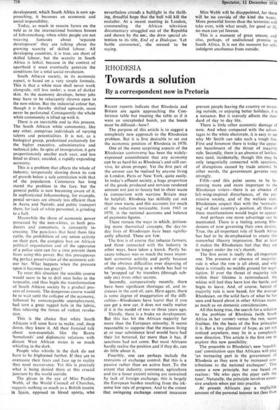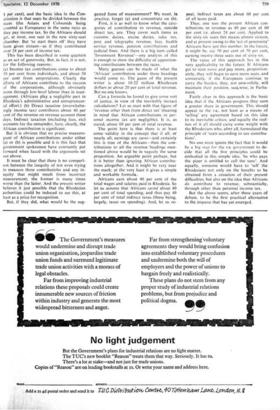RHODESIA
Towards a solution
By a correspondent now in Pretoria
Recent reports indicate that Rhodesia and Britain are again approaching the Con- ference table but treating the table as if it were an unexploded bomb, yet the bomb must be diffused—how?
The purpose of this article is to suggest a completely new approach to the Rhodesian problem. But it is first desirable to set out the economic position of Rhodesia in 1970.
One of the more surprising aspects of the Rhodesian controversy has been the widely- expressed astonishment that any economy can be as hard-hit as Rhodesia's and still sur- vive, let alone prosper. Yet the first part of the answer can be realised by anyone living in London, Paris or New York, quite easily. In today's affluent society, a huge proportion of the goods produced and services rendered amount not just to luxury but to sheer waste (a comparison with wartime Britain may be helpful). Rhodesia has skilfully cut out their own waste, and this accounts, for much- of the reduction noticeable, from 1965 to 1970, in the national accounts and balance of payments figures. -
There remain the ways in which, jettison- ing more theoretical concepts, the day-to- day lives of Rhodesians have been signific- antly affected. These are few.
The first is of course that tobacco farmers, and those connected with the industry in other ways, have taken a knock. Partly be- cause tobacco was so much the most impor- tant economic activity and partly because of the obvious difficulties over disposing of other crops, farming as a whole has had to be 'propped up' by transfers (through sub- sidy etc) from other sectors.
Secondly, comparatively recently, there have been significant shortages of, and in- creases in the cost of, cars. Here again, there is some degree of exaggeration of the diffi- culties—Rhodesians have learnt that if you can get a new car, it does not really matter if it is the model of two or three years ago.
Thirdly, there is a brake on development. But this has hit the African majority far more than the European minority. It seems reasonable to suppose that the masses living at or near subsistence level would have had their lot bettered, far more than it has, if sanctions had not come. But most Africans hardly realise the position and if they do, can do little about it.
Fourthly, one can perhaps include the restraints of exchange control. But this is a passive rather than an active hurt. ,To the extent that industry, commerce, agriculture and (to a lesser extent) mining are restrained by lack of foreign exchange, this is largely the European burden resulting from the irk- some low rate of progress. And to the extent that swingeing exchange control measures prevent people leaving the country or invest. ing outside, or enjoying better holidays, it is a nuisance. But it scarcely affects the stan- dard of day to day life.
There is little other economic damage of note. And when compared with the advan- tages to the white electorate, it is easy to see why Mr Smith can take such a tough line. First and foremost there is today the appar- ent banishment of the threat of majority rule. Secondly, there is an absence of lawless- ness (and, incidentally, though this may be only tangentially connected with sanctions, of disruptions caused by trade unions). In other words, the government governs very strongly.
Fifth—and this point seems to be be- coming more and more important to the Rhodesian voters—there is an absence of left-wing-inspired disturbances, of the per- missive society, and of the welfare state. Rhodesians suspect that with the 'normalis- ing' of their country's position, all three of these manifestations would begin to appear.
And perhaps one more advantage can be mentioned. There is a feeling among Rho- desians of now governing their own destiny. True, the all-important role of South Africa has had to be de-emphasised to create this somewhat illusory impression. But at least it makes the Rhodesians feel that they are no longer under the uic's thumb.
The first point is really the all-important one. The presence or absence of majority- rule is what the row is all about, and why there is virtually no middle ground for nego- tiation. If ever the threat of majority rule within their lifetime is reintroduced, the whites will feel they have lost the battle, and begin to leave. And, of course, hatred of majority rule is now based, for the average Rhodesian, on the solid facts of what he has seen and heard about in other African states, as much as on domestic considerations.
All this being true, the search for a solution to the problem of Rhodesia (with South Africa in her corner) versus the rest, seems fruitless. On the basis of the five principles it is. But a tiny glimmer of hope, as yet not noticed anywhere, may lie in a completely new direction. This article is the first one to explore this new possibility.
The preamble to Rhodesia's new 'republi- can' constitution says that Africans will play 'an increasing part in the government of Rhodesia as they earn it by increased con- tributions to the national exchequer'. This seems a new principle, but one based on realism : 'He who pays the piper calls the tune'. Naturally, the principle involves exten- sive analysis when put into practice.
At present Africans pay a negligible amount of the personal income tax (less than I per cent), and the basic idea in the Con- stitution is that seats be divided between the races (the Asians and Coloureds being counted as Europeans) in the same ratio as they pay income tax. So the Africans should get, at most, one seat in the new sixty-seat chamber. But `to start them off' they have been given sixteen—as if they contributed over 24 per cent of income tax.
This has been described in some quarters as an act of generosity. But, in fact, it is not, for the following reasons: (a) Income tax contributions come to about 50 per cent from individuals, and about 50 per cent from corporations. Clearly the efforts of Africans contribute to the success of the corporations, although obviously more through low-level labour than in man- agement. (Africans play a negligible part in Rhodesia's administrative and entrepreneur- ial effort.) (b) Direct taxation (overwhelm- ingly income tax) contributes about 40 per cent of the revenue on revenue account these days. Indirect taxation (including fees, etc) accounts for the remainder; here, clearly, the African contribution is significant.
But it is obvious that no precise measure- ment of African contributions under either (a) or (b) is possible and it is this fact that government spokesmen have constantly put forward when faced with the arguments set out above.
It must be clear that there is no compari- son between the inequity of not even trying to measure these contributions and any in- equity that might result from incorrect measurement; the former is many times worse than the latter. And the present writer believes it just possible that the Rhodesian authorities could be induced to see this, at least as a price for recognition.
But, if they did, what would be the sug- gested form of 'measurement? We must, in practice, forget (a) and concentrate on (b).
First, it is as well to know what the cate- gories of contribution to revenue, outside direct tax, are. They cover such items as customs duties, excise duties, sales tax, post and telegraphs revenue, fees, health service revenue, pension contributions and judicial fines. And there is a big item called 'Investment Revenue'—any analysis of this is enough to show the difficulty of apportion- ing contributions between the races.
Many guesses can be made of what the 'African' contribution under these headings would come to. The guess of the present writer is about 18-22 million Rhodesian dollars or about 20 per cent of total revenue. But no one knows.
Can a formula be found to give some sort of justice, in view of the inevitably inexact calculations? Let us start with that figure of `revenue other than from direct tax' (bearing in mind that African contributions to per- sonal income tax are negligible). It is, as stated, about 60 per cent of total revenue.
The point here is that there is at least some validity in the concept that if all, or nearly all, earnings are spent—and certainly this is true of the Africans—then the con- tributions to all the revenue headings men- tioned above would be in vaguely the same proportion. An arguable point perhaps, but it is better than ignoring African contribu- tions altogether. And it might be very near the mark; at the very least it gives a simple and workable formula.
Africans earn about 40 per cent of the total wages and salaries paid in Rhodesia. So let us assume that Africans spend about 4() per cent of total spending, and thus pay 40 per cent of total indirect taxes (these being, largely, taxes on spending). And, let us re- peat, indirect taxes are about 60 per cent of all taxes paid.
Thus, one sees the present African con- tributions to revenue as 40 per cent of 60 per cent i.e. about 24 per cent. Applied to
the sixty-six seats this means almost sixteen, and at present owing to the 'act of generosity' Africans have just this number. In the future, it might be. say 50 per cent of 70 per cent, earning twenty-three seats out of sixty-six.
The value of this approach lies in this very applicability to the future. If Africans get to earn more and pay more, proportion- ately, they will begin to earn more seats, and conversely, if the Europeans continue to
carry the burden, they, not unworthily, will maintain their position, seatrwise, in Parlia- ment.
Fairly clear in this approach is the basic idea that if the Africans progress they earn a greater share in government. This should
appeal to the UK. not least as a means of 'selling' any agreement based on this idea
to its inevitable critics; and equally the real- ism of it all should carry some weight with the Rhodesians who, after all, formulated the principle of 'seats according to tax contribu- tions'.
No one must ignore the fact that it would be a big step for the UK government to de- cide that all the five principles could be embodied in this simple idea, 'he who pays the piper is entitled to call the tune'. And equally, someone would have to 'sell' the Rhodesians not only on the benefits to be obtained from a cessation of their present difficulties, but also on the idea that Africans do contribute to revenue, substantially, through other than personal income tax. But the above seems, after these years of debate, to be the first practical alternative to the impasse that has yet emerged.











































 Previous page
Previous page